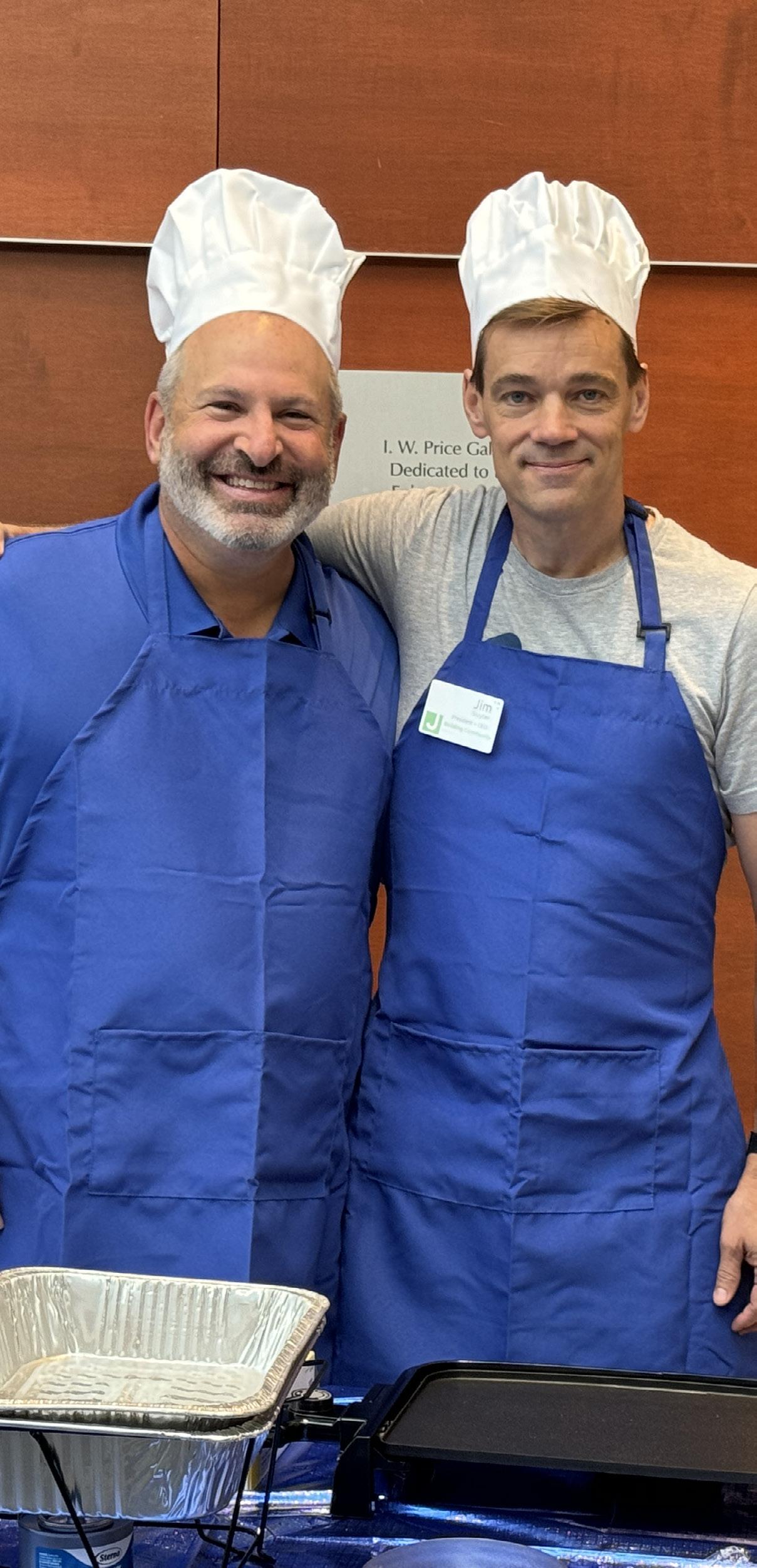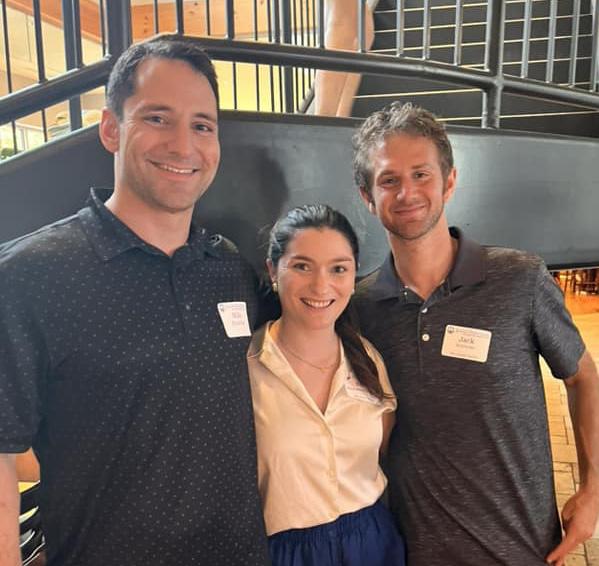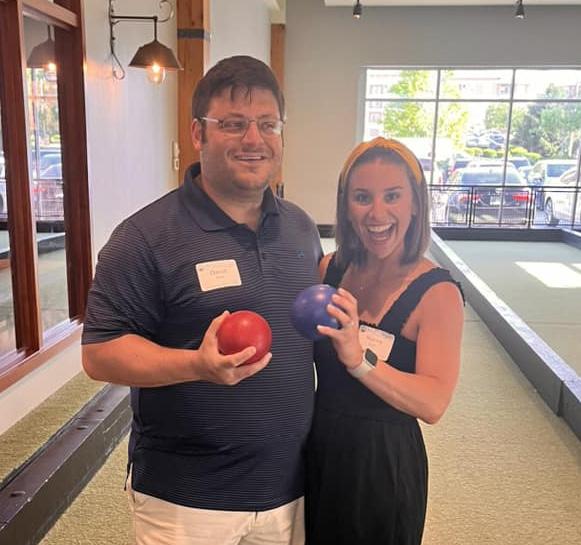In this issue...



By The Chronicle Staff
Day of Discovery registration opens

Village Shalom hosts Father’s Day run

JCF names grant recipient programs
Parashat Korach
Shabbat times (Overland Park):
Candlelighting: 8:29 p.m. Havdalah: 9:34 p.m.
After nearly six years serving as the executive director of Jewish Community Relations Bureau | AJC Kansas City (JCRB|AJC), Gavriela Geller has announced her departure.
According to an email sent to the community, which included statements from Geller and JCRB|AJC Board President Barry Kaseff, Geller intends to “move on to a new professional chapter.”
“We will be very sorry to see her go. Gavi’s tenure has been extraordinary,” Kaseff said. “She helped to establish a strong strategic path for the organization, effectively integrating the dual missions of both JCRB and AJC into a robust and impactful portfolio of initiatives.
“Gavi and her staff have developed innovative programming that will benefit the organization for years to come. And of course, Gavi has led the community with particular strength and passion af-
Beni Israel Cemetery in Eudora, Kansas, has been awarded $28,605 for site upgrades, historical research and public engagement. The money comes from a grant as part of the Douglas County 2024 Natural and Cultural Heritage Program.

See page 2

ter the terrible events of Oct. 7.”
Geller will be assisting with the transition, and the current JCRB|AJC staff will continue with their respective duties. The board will convene a search committee to find a permanent executive director, but in the meantime, Neta Meltzer, the organization’s director of community and government relations, has been named the interim executive director.
“With today’s dramatic increase in the dual forces of antisemitism and anti-Zionism, we are particularly fortunate to have a skilled team in place who will continue to help our community navigate these difficult times,” Kaseff said. “Equally important during any time of transition is the support and partnership of our parent organization, and we are very grateful for our strong relationship with AJC Global.”
In her statement, Geller said the growth of JCRB|AJC was a focus from the beginning. When she joined JCRB|AJC in 2018 — just five days before the Tree of Life shooting — it was only a two-person organization.
“In the five and a half years since, we have significantly expanded our capacity and the capabilities of this organization — allowing us to grow our impact and reach even further across the region,” she said.
See page 3
After nearly 24 years, Kevin Taylor is retiring from his position as chief financial officer of the Jewish Community Foundation of Greater Kansas City (JCF). Elizabeth Peden, former executive director of Kehilath Israel Synagogue, will succeed Taylor as the Foundation’s new CFO.

The cemetery was founded in 1858 by territorial settlers who relocated to the area via the German Immigrant Settlement Company of Chicago, See page 5
Taylor and Peden plan to work together for the next several weeks to ensure a smooth and successful transition.
Taylor, who was hired by former JCF executive director Susie Gold-

The Chronicle and Jewish Federation staff experienced a loss last week. Marsha Cott passed away. For those in the Jewish community who knew her, it was likely because she was the first person who greeted you when you walked into the Jewish Federation offices.
Her official job title — “receptionist and engagement administrative associate” — didn’t really matter, because everybody knew that Marsha did a bit of everything, and did it well. Chuck Green, Federation’s community security director, gave her the nickname of “The General,” joking that she was the one who ran things.
Beyond her Federation work, Marsha was also The Chronicle’s unofficial third staff member. She was instrumental in working out the kinks of The Chronicle’s transition from private ownership to Federation in 2020. She would help with countless administrative aspects of The Chronicle; thoroughly proofreading every Chronicle before we sent it to publishing and offering moral support every time I was feeling down, overwhelmed or upset.
But her work, as wonderfully as she did it, is not what she should be remembered for.
I don’t know if I ever told her explicitly, but Marsha was one of my best friends. There were a lot of differences between us — Marsha was a strong, outspoken woman in her 70s from rural Missouri, and I am an anxious guy in my 20s from a suburban Jewish community — but we got along and
understood each other. There were days in the office when I found that I’d spent an hour or more standing at the front desk, talking and laughing with her. We talked about almost everything you can imagine — school, work, music, cars, politics, history, religion, fashion, technology, travel and so much more.
I am a strong proponent of the idea that everybody has good stories to tell, even if they don’t think they do. Marsha, however, had better stories than most. For example, I can’t think of another person who, as a petite woman, decided to get a semi-truck driver’s license just to prove that she could. She saw Neil Diamond (her all-time favorite musician) at least a million times, and her automotive history was illustrious, to say the least (her first car was a Pontiac G.T.O., and she would drive a race-prepared C2 Corvette in city parades).
Marsha loved and often reminisced about her late parents and grandmother, and often told stories about her father’s time in the U.S.A.F. flying B-29s and how he built their house in Edgerton, Missouri. She deeply missed her late brother, Eric, and would always brag about how magnificent he was both as an athlete and as an older brother.


him.
Above all, she adored her son, John, and her granddaughters, Natalie and Erica. She even loved her granddog, Lemmy. Near the end of her life, she reconnected with her longtime friend, Mike, and there was always a happy glint in her eye when she mentioned
I hope I’ve given you a glimpse into how great and loving Marsha was. We all miss having her as a friend and colleague. May her memory be a blessing, may she rest in peace, and may everyone know that she was one of the best.

continued from page 1
Illinois. It is the major surviving property associated with the Jewish community, which flourished in Eudora from 1857 to 1867 before relocating to Lawrence, Kansas.
Among those interred at the cemetery are the founding fathers of Eudora, including city councilmen, the city clerk, postmaster and several business owners. It is one of only two Jewish cemeteries in Kansas and appears on the national record of histor-
ic sites.
Lawrence Jewish Community Congregation (LJCC) took over custody of the cemetery in 1978 after a period of abandonment and neglect. Several upgrades have been done over the years as well as regular mowing and maintenance.
Projects funded by the two-year grant will include the restoration of nine of the early headstones, upgrades to the existing driveway, addition of benches and signage to in-
clude an interpretive sign linking to various historical and genealogical websites.
LJCC will be hosting an onsite tour this fall, led by KU American Studies and History Professor Emeritus Dr. David Katzman. Dr. Katzman will also guide further research about the cemetery and the early settlers of Douglas County.
Those interested in learning more about these projects can contact the LJCC at (785) 841-7636.
Sam Kricsfeld Editorandbusinessmanager
Lacey Storer Assistant editor


member of the


For the 10th year, the C You in the Major Leagues Foundation held its four-day Youth Baseball Camp at The J, celebrating a decade of partnership.
The camp is put on by Dayton Moore, special assistant to the general manager of the Texas Rangers and the former vice president of baseball operations for the Kansas City Royals. It’s run through his Kansas City-based C You In The Major Leagues Foundation (CYITML). The four-day camp took place from June 17 to 20 at The J. Campers learned drills and skill training as well as kindness and character.
Moore brought the camp to The J following the 2014 murders of Reat Underwood, his grandfather Dr. William Corporon and Terri LaManno by

a white supremacist outside of Jewish facilities.
“After the tragedy, we wanted to do something to help the Jewish Com-
continued from page 1
Initiatives during Geller’s tenure include creating the Prepare to Respond, Educate to Prevent (PREP) program, training 1150 educators and graduating over 100 Jewish high school students through Leaders for Tomorrow (LFT); developing the organization’s DEI and workplace program, Making Space; helping pass the NO HATE Act in 2021; achieving adoption of the IHRA Working Definition of Antisemitism

Outgoing
“Driving Out Darkness in the Heartland” antisemitism summit in April.
in Kansas in 2022; IHRA adoption in 12 municipalities in 2023; and securing half a million dollars in the Kansas budget for Jewish community security in 2024.
An article in The Chronicle’s June 20, 2024, issue, erroneously included information that the after-school spaces at The J had not been updated since The J was built. They had actually been updated about 25 years ago with funding secured by community members Karen Gerson and Jill Maidhof.
This past April, JCRB|AJC hosted “Driving Out Darkness in the Heartland,” the region’s first summit on antisemitism, an event that included AJC CEO Ted Deutch and Second Gentleman Doug Emhoff as speakers.
JCRB|AJC has become “not just a transformed organization in Kansas City — we are a national model charting new paths in the field. I know that this incredible team will continue to
lead our community from strength to strength,” Geller said. “From the very beginning, my vision was to build an organization that did not need me; I wanted to build a team who could continue this vision on behalf of our community. For some time now I have realized that my goal has been reached. And so while moving on is always bittersweet, it is also with great pride that I share that I have accomplished what I set out to do, and I will soon be moving on to a new professional chapter.”
munity Center family heal,” Moore said. “We reached out to Bob Hennecke, The J’s director of sports and recreation. He asked if we’d be willing to do a baseball camp for their families and others in the community. It was a no-brainer for us… The camp quickly has become a highlight of our summer.”
Hennecke said, “We feel very fortunate that Dayton has held his camp at our facility over the past decade.”
At the conclusion of the Wednesday morning camp session, Moore presented a $5,000 donation to SevenDays, represented by former board member Tony Corporon and his family.
“With this being the 10-year anniversary of the tragedy and the 10th year of this camp, we felt it would be appropriate to make a donation to go toward the terrific work that is happening with the SevenDays foundation,” Moore said. “Our good friend (SevenDays co-founder) Mindy Corporon has been an inspiration to our community through her courage and strength, so we are proud to honor her and her family.”
SevenDays was created 10 years ago to overcome hate by promoting kindness through education and dialogue. Corporon was touched by the gesture of kindness.
“My son, Reat, adored baseball and played from age four to 13. Our family enjoyed the camaraderie of teammates and their families, exciting trips to tournaments and simply the pleasure of being together in support of Reat,” Corporon said. “When he left the ball field for the stage we followed him there, too. SevenDays is grateful for humans like Dayton Moore, who not only feel inclined to be kind but actually do so. We appreciate the generosity of C You in the Major Leagues on behalf of every young person SevenDays engages with kindness.”



Paige Krug and Nathan Herman
Paige Krug and Nathan Herman were married on May 26 at the Marriott St. Louis Grand in St. Louis, Missouri. The bride is the daughter of Elise and Mark Krug of St. Louis, Missouri. She is the granddaughter of the late Kathleen Jacobson; the late Philip and Corrine Jacobson; the late Judy Krug

and Robert Bernstein
of Overland Park, Kansas; and the late Sanford Krug of Prairie Village, Kansas.
Her maid of honor was her sister, Rachel Krug. Bridesmaids and bridesmen included Ellie Marschinke, Jordyn Previn, Shayna Rosenak and Billy Do. The flower girls were Sasha and Rory Durlester.
The groom is the son of Adina Herman of Highland Park, Illinois, and Mark Herman of Chicago, Illinois. He is the grandson of Elissa Rolnick Rubinstein and the late Lawrence Rubinstein of Glencoe, Illinois; and Gayle Herman and the late Morton Herman of Chicago.
His best men were his brother, Sammy Herman; Ari Nemetz; and Pierre Deliso. Groomsmen included Brennen Muller, Mack Muller and Scott Hammersley.
Following a honeymoon in Punta Cana, Dominican Republic, the couple will reside in Chicago.
Dr. Phyliss and Robert Bernstein of Kansas City, Missouri, celebrated their 60th wedding anniversary on June 7.
The couple celebrated with all their children and grandchildren on a European Disney Cruise to Spain, Greece and Italy. They are the parents of Steve Bernstein (Aimee), Susan Bernstein (Chucker Luetje) and David Bernstein (Christina), and the grandparents of Noah and Isabel Bernstein; Chad, Julia, Ali and Adam Luetje; Charlie, Sam and Louie Bernstein; and Max and Miles Gelman.
The J’s Safe Sitter program was recently recognized as a 2023 Gold Level Safe Sitter Provider, which is designated for programs who teach more than 125 students annually.

In 2023, The J taught 280 students through Safe Sitter and an additional 130 through “Safe@Home by Safe Sitter” — almost triple the number of students who participated in 2022.
Participants in a recent Safe

Safe Sitter began in 1980 as a way to prepare young teens to care for younger children by providing life skills, safety skills and child care training in order to build safer communities. The program provides medically accurate and developmentally appropriate curriculum for all participants.
The J was also recognized as the largest Safe Sitter provider in Kansas for 2023. The number of students was a record high for The J’s program.
“We love working with Safe Sitter to provide exceptional educational caretaking opportunities for young teens in our area,” said Anna Ferguson, Clubhouse Manager and Safe Sitter program manager at The J. “We know by offering this program, we are making a difference in the lives of countless families in our community.”
Safe Sitter courses are designed for
young teens aged 11-14, while “Safe@ Home by Safe Sitter” courses are for ages 8-11. “Safe@Home by Safe Sitter” is designed to prepare students to be safe and care for themselves when parents are away for short periods of time.
In 2023, under Ferguson’s leadership, The J began offering one or two private classes per month to youth sports teams, scout troops and groups of friends, which helped spur the record growth of the program. Additionally, Ferguson noticed that she’s begun to engage with students who’ve had friends or family members take the class previously.
“Word of mouth has been a powerful driver for the success of our program, and it also tells us that participants and their families are seeing tremendous value in the Safe Sitter courses we offer,” Ferguson said.
More information regarding the Safe Sitter programs is available at thejkc. org/safesitter or by contacting Ferguson at annaf@thejkc.org or (913) 327-4642.
This year’s annual Day of Discovery will take place on Sunday, Aug. 18, and registration for the event is scheduled to open on Friday, July 5.
The Day of Discovery sessions will take place at the Jewish Community Campus. Information on this year’s sessions, presenters and registration is available at dayofdiscoverykc.org.
The deadline to register is Aug. 9, and participants are encouraged to register early, as some classes have limited space available. Registration fees increase after Aug. 9. Day of Discovery, which is a partnership of Jewish Experiences, a collaboration of Jewish Federation and The J, and the Rabbinical Association
of Greater Kansas City, is held as an opportunity for the entire Jewish community to discover and explore Jewish learning in Kansas City.

Participants will have the opportunity to learn, study and discover from community Jewish educators, clergy, professors and experts as they lead sessions on a range of topics throughout the day. More than 20 different courses will be offered this year.
Lunch is offered at an additional cost by Kim Matsil (Kim’s Kreations). Due to

kitchen availability, only dairy options will be available.
This program is funded in part by the Jewish Federation of Greater Kansas City.

More information is available by visiting dayofdiscoverykc.org or contacting Megan Pener, manager of Jewish Experiences, at meganp@thejkc.org or by phone at (913) 327-8163.
2024 Day of Discovery Sunday, Aug. 18
The J, 5801 W. 115th
continued from page 1
Over the years his responsibilities and expertise grew as he advanced within the organization. In his role as CFO, Taylor is an integral part of the leadership team and is responsible for the Foundation’s financial and investment operations and the administration of all fiscal functions.
“I have enjoyed the unique combination of nonprofit accounting and investment analysis that working at the Jewish Community Foundation brings,” Taylor said. “My favorite part has been the honor of being entrusted with the assets of the Foundation. I often pause and think about the years of hard work, ingenuity and risk taking that our donors endured, manifesting finally in the form of a generous donation to the Foundation. I’ve never lost my sense of awe over what it all represents.”
During Taylor’s tenure, Foundation assets have grown from $70 million to $290 million, in large part due to his skilled fund administration and management. He has led the implementation of financial and investment policies established by the JCF Board of Trustees and has worked closely with JCF’s audit, administrative, gift acceptance and investment committees to develop and execute strategies that have strengthened the organization and supported the Foundation’s role as the central resource for philanthropy in the Jewish community.
“Though Kevin’s primary responsibility is to make sure the requests of our clients are executed promptly and
accurately, he does so much behind the scenes that most people never see,” JCF trustee Bob Palan said. “Kevin is focused on all JCF operations, not just the ‘numbers’ and our financial performance. He ensures that JCF maintains a very high level of service in dealing with donors, agencies, and suppliers, and projects a calm and unemotional way of handling issues. Simply put, Kevin keeps the business of JCF running smoothly. I wish him nothing but success and happiness in the next phase of his career.”
“Kevin has set a standard for excellence, having played a pivotal role in the growth and professionalism of the Foundation,” JCF Executive Director Josh Stein said. “He is admired by his colleagues, lay leadership and fundholders alike and will be missed on both a professional and personal level.”
Elizabeth Peden is set to start as CFO this month.
“Fortunately, Elizabeth comes to JCF with many strong attributes, and we are so excited for her to join the team and build upon the past success in this critical role,” Stein said.
“After a comprehensive search, we’re excited to welcome Elizabeth to the JCF team,” said Brian Scharf, chair of JCF’s investment committee and the CFO search task force. “Elizabeth is extremely well regarded in the Jewish community and has an outstanding professional reputation. The task force was impressed with her accounting and resource management experience, and we have the utmost confidence that she’ll excel in her new role.”
Peden has worked in the Jewish community for more than 20 years and has served as executive director of Kehilath Israel Synagogue for the past 17. She has a master’s degree in accounting, as well as a CPA certificate. Peden’s background in fiscal, facility and personnel management will be valuable assets in her new position at the Foundation, as will her relationships within the Jewish community.
“I was drawn to this position for the opportunity to assist people with their tzedakah and to work with a great group of donors, volunteers and professionals, making a difference in this world,” Peden said. “In my new role, I hope to assist in strengthening and growing the Foundation for the benefit of the community. It’s about giving people the tools and resources to fulfill their charitable goals and the joy of helping them make our world a better place.”
“Kevin has been such a valuable asset to JCF that it was difficult to imagine how we would ever replace him,” said Frank Lipsman, president of the JCF Board of Trustees. “Fortunately, our excellent search committee brought Elizabeth to us, and we are thrilled that a seasoned professional will assume responsibility for the financial matters critical to the operation of JCF. Kevin has graciously agreed to remain with JCF for the rest of the summer in order to ensure that Elizabeth’s transition is smooth. We are very sad that Kevin’s 24-year tenure at JCF is coming to an end, but we are excited to welcome Elizabeth to the team.”
As for Taylor’s retirement plans, he said, “I plan to stay busy. I hope to remain employed in some fashion, perhaps involved in either investments or accounting, or both. Accounting is ultimately about storytelling, and I would like to continue telling stories.”



Jason Kotlyarov named to board
Jason Kotlyarov was recently appointed to serve on the Board of Directors of Donnelly College, in Kansas City, Kansas, effective July 1.

Kotlyarov is an employee benefits and executive compensation associate in the Kansas City office of Kutak Rock and serves on Jewish Federation’s Young Adults Division committee.
Jenna Brofsky recognized
Husch Blackwell was one of 40 law firms honored with the 2024 Beacon of Justice Award from the National Legal Aid & Defender Association (NLADA) for their efforts to address civil and human rights issues.

Husch Blackwell was recognized for its large-scale pro bono program to assist Afghan refugees facing the one-year deadline to file for affirmative asylum in the U.S. after the fall of the Afghan government in 2021.
Spearheaded by Husch Blackwell partners Jenna Brofsky, a Jewish community member, and Kelli Meilin, the firm partnered with Jewish Vocational Service (JVS) to assist more than 50 individuals with their asylum applications. Brofsky is a JVS board member.
Between May and October of 2022, the firm contributed more than 1,620 pro bono hours valued at more than $500,000 to the Afghanistan Emergency Assistance Project.
give back
Fifth-grade art students at Oak Hill Elementary, in the Blue Valley School District, recently made a big impact on our Jewish community.
As part of their annual service project, the class created clay hearts and sold them to fellow students and school staff. As a result, the class was able to make a $1,000 donation to Jewish Family Services.
Do you know an outstanding high school student who is interested in Jewish advocacy? Jewish Community Relation Bureau | AJC Kansas City (JCRB) is currently accepting applications for its Leaders for Tomorrow (LFT) program.
LFT is designed to empower the next generation to advocate on behalf of the Jewish people and Israel.
High school sophomores, juniors, or seniors who are interested in applying for a spot in the 2024-25 LFT cohort, beginning Fall 2024, can learn more at jcrbajc.org.
1. Uzis
5. Hid Jericho spoils
10. Adam’s birthplace
14. Piece for Lasker
15. Social-realist artist
16. Etrog’s cousin
17. Jerry Lewis schtick
18. Bayit (Eng)
19. Boxer Max
20. Baseball’s Shamsky
21. Jerusalem mount
22. P. Silvers role
23. Tel-Aviv to Bet
She’an (dir)
25. Hester or Bar Ilan
28. Caribbean pirate
31. Greenberg stat
32. Depot (abbr)
35. Haman’s ninth
36. Bugsy or Lepke
38. “_ Cousins” Birmingham novel
39. Hebrew letter
41. Chazzan’s concern
42. Sabras
44. Rose of __
46. Daled: (Eng.)
47. Genesis starter
48. Kol Nidre chanters
49. PLO leader __ Arafat
51. Tu B’shevat planting?
52. Bridge maven
55. Edomite mountain
57. Tu B’ Shevat planting?
60. First Swedish Jew
61. A tel
63. Imitate Koufax 64. Spar
65. “The Yeshiva”, writer 66. Khazars’ homeland 67. Idina Menzel, voice of “Queen __” 68. Conductor, Zubin __ 69. Eden wear?
1. Zionist movement
Sound from Daniel’s den 3. Jerusalem windmill 4. Arkia milieu 5. Babylonian Talmud editor
Select 7. Act the Dybbuk
Seder sounds?
Be’er Sheva to Jerusalem (dir) 10. Israeli defense company
Sun __ of Ahaz
Valley (Heb.)
“__ Wolfe”, Chaykin role
__ Beta Tau, fraternity
Torah portion
Chant Megillat
Borgnine or Bloch
Prior

See page 10 for answers
We at The Chronicle are happy to announce that we will be including Jewish crosswords in upcoming issues. These crosswords have Jewish themes and clues related to Torah, music, sports, Hebrew, Yiddish and more. Our only hint to you is to use Ashkenazi spelling. You can check your work on page 10. Have fun!



• ASK THE RABBI (pg. 12)
• BENI ISRAEL (pg. 1)
• CYITML (pg. 3)
• DAY OF DISCOVERY (pg. 4)
• FIRST CALL (pg. 8)
• GAVRIELA GELLER (pg. 1)
• LITTLE MERMAID (pg. 9)
• MENORAH (pg. 8)
• SAFE SITTER (pg. 4)
• VILLAGE SHALOM (pg.8)
The words you’ll be searching for are all subjects of articles in this week’s Chronicle! The words can be forward or backward, oriented up and down, left and right or diagonal.










The Temple, Congregation B’nai Jehudah’s Sisterhood recently installed its new board members. Pictured (top to bottom) are the three Sisterhood award winners: Kristi Kanarek for Service to Sisterhood; Alissa Yamnitz for Emerging Leader; and Rita Sudhalter, Shoshana honoree, the Sisterhood’s highest award.
Pictured with Sudhalter is special guest Sonia Washawski
who was in a ghetto and camps during the Holocaust with Sudhalter’s parents.



By Ellie Holsten
For the 100th anniversary of the Statue of Liberty in 1886, German-American artist Manfred Anson was commissioned to create this Hanukkah menorah. This piece is part of the original run of 52 castings. Each of its candleholders is a miniature Statue of Liberty. The bases of each statue are labeled with impactful events in Jewish history. The branches on the right have events that occurred thousands of years ago, like the Maccabean victory that inspired Hanukkah. The branches on the left are labeled with more recent events, like Israel’s declaration of independence in 1948.
Manfred Anson was born in Germany before World War II and escaped the Holocaust through a project by the Jewish Welfare Guardian Society of Australia. While he was serving in the Australian army, his family was sent to death camps. His brother was killed, but his parents and sister survived. Anson’s sister immigrated to the United States, and she was eventually able to contact him in Australia. He moved to America to join her and took up an interest in collecting souvenirs from his new home. The Statue of Liberty figurines on this Hanukkah menorah were actually cast from souvenirs from the Statue of Liberty gift shop.
The Kansas City Jewish Chronicle and the Klein Collection are partneringtoshareandhighlightsomeofthe collection’suniquepieces.
Village Shalom revived its annual Father’s Day Run this year. Spearheaded by Village Shalom Board Chair Bob Gershon, the run was previously known as the “May Day Race” and had been held since 1987. This annual event has historically supported dementia-care programs and fostered community involvement and fundraising.
The Father’s Day Run featured a variety of activities, including 5K/10K races, racewalking and a Kids’ Fun Run.
The last race hosted by Village Shalom was in 2017, drawing over 650 participants, volunteers and sponsors, raising more than $20,000 for memory care services. Due to subsequent challenges, including the pandemic and organizational transitions, the race hadn’t been held since then.
The commitment to resurrect this race underscored its importance to the community and its role in supporting community programs. This determination and belief in the race’s positive impact rallied support, especially during a period of transition for the Village Shalom Development Office. The theme of this year’s race was “We’re Making a Comeback.”
David Spizman and Hope Howe, Village Shalom’s new development team leaders, were tasked with reviving the Father’s Day Run just six weeks before the scheduled event, without prior experience in organizing a race. Supported by Gershon, they were able to organize the race.
With only one week left before race

day, Spizman and Howe had secured $20,000 in sponsorships, enlisted 20 volunteers and attracted more than 200 participants, surpassing expectations and prompting additional preparations to accommodate the growing turnout.
On the day itself, 326 participants, more than 50 volunteers and numerous sponsors and donors, promoted community spirit and raised essential funds for memory care services and the financial assistance program at Village Shalom.
Howe, new to the Jewish community, said she was “deeply moved by the outpouring of support and collaboration from diverse backgrounds, which played a crucial role in making the Father’s Day Run a resounding success.”
The planning and execution by Village Shalom staff, supported by the
Kansas City Running Club, resulted in a successful race day, including everything from course setup to timing, entertainment and logistics.
Village Shalom staff and leadership say that the run’s platinum sponsors, Nexdine Hospitality and Brett’s Lawn, Inc., were instrumental in making the Father’s Day Run a success. They also voiced appreciation for Alex Gold from KCSP 610 Radio, who lent his voice as the race’s emcee; the KC Hooper girls for providing entertainment and fun hula hooping demonstrations; and Martin City Brewing Company for providing post-race craft beers.
Spizman and Howe said they are eager to build on this success in future editions of the Father’s Day Run, with plans to introduce enhancements and benefit from a more extended planning period.
Jewish Family Services (JFS) is partnering with nonprofit First Call to host a seven-week session of its “How to Cope” program. The course helps participants overcome the related physical, psychological and social effects of caring for their loved ones impacted by substance abuse, addiction or an untreated mental health illness.
“How to Cope” is intended to address feelings of helplessness, isolation, and guilt which family members may feel and help them build a healthy life
for themselves.
The free program will be held at JFS’ Brookside location (425 E. 63rd St., Kansas City, MO 64110) from 6 to 8 p.m. on Tuesdays between July 9 and Aug. 20. Pre-registration is required at firstcallkc.org.
First Call is a nonprofit organization whose mission is reducing the impact of alcohol, drugs and other addictions by providing quality resources to individuals, families and the community.
“We are so excited and grateful for
this opportunity to partner with First Call,” says JFS Clinical Director Jesse Sieve. “This is a research-informed program that’s proven to strengthen relationship skills and increase resiliency. JFS is here to not only provide a safe place for our Jewish community to convene but [also] to connect people to a strong support system, including JFS’ therapists, social workers and spiritual care staff.”
The sessions will be facilitated by Shelby Krech, MPS, MAADC-II, C.
“Disney’s The Little Mermaid” opens at The Lewis & Shirley White Theatre at The J on Saturday, July 6, where it will run for 14 performances on Wednesdays, Thursdays, Saturdays and Sundays through July 28.
Tickets and more information are available at TheWhiteTheatre.org.
Following the Sunday, July 21, performance, a special “Under The Sea Party” will be held in the Multi-Activity Center, adjacent to The White Theatre, beginning at 4:30 p.m. Guests can enjoy craft activities, a photo booth, food, and appearances by the show’s performers.
Guy Gardner will direct a cast of veterans and newcomers to The White Theatre stage. Gardner himself is not new to The White Theatre, having directed “Matilda” and “The Addams Family,” both in 2022. He has also performed on the stage in “Kinky Boots,” “Anything Goes” and “Spamalot.”
As director, Gardner and his team are responsible for creating the “under the sea” environment, including the illusion of swimming on stage.
“Swimming in the show has been an artistic choice at so many theaters in so many different ways,” Gardner said. “In this production, I believe the audience will understand when we are truly underwater and when we are above. Actors will move their bodies in certain ways when ‘under the sea,’ and a few of them may swim right in the middle of what we consider ‘thin air.’”
“Disney’s The Little Mermaid” cast is led by Lacy Goettling as mermaid Ariel. This will be Goettling’s debut on The White Theatre stage. Austin Skibbie is making their debut as well, taking on the role of sea villain Ursula.
Goettling and Skibbie are joined by Zane Champie as Prince Eric, who recently starred in The White Theatre’s production of “Kinky Boots” as Charlie Price. Other veterans include Donald Davis as King Triton, Hew McKoy as Sebastian, Louisa Bartlett as Flounder, Meredith Hollan as Flotsam/Ursula understudy, Alex

Gumminger as Chef Louis/Scuttle understudy, Kayleen Spear as Andrina/Ariel double, Alana Shields as Aquata, A.J. Valle as Atina and Mandy Dulny as Adella.
Other newcomers to The White Theatre include Chip Buckner as Grimsby, Ellen Welander as Scuttle, Morgan Ball as Jetsam, Theresa Chambers as Arista and Natalia Monteiro as Allana. Tristan Jacobson, Jacob Valle, Tyler Taylor, Miles Wirth, Nathan Anderson and Topher Michael round out the cast as the sailor ensemble.
“The stage production of ‘The Little Mermaid’ has all of the heart and wonder that the original movie did,” Gardner said. “Whether you are remembering it from the past, or discovering it in the present, you will leave with a smile on your face. I think audiences should be ready for a few hours of pure entertainment.”

Based on the Hans Christian Andersen story and the classic animated film, “Disney’s The Little Mermaid” centers on Ariel, King Triton’s youngest daughter, who wishes to pursue the human Prince Eric in the world above, bargaining with the evil sea witch, Ursula, to trade her tail for legs. But the bargain is not what it seems, and Ariel needs the help of her friends, Flounder the fish, Scuttle the seagull and Sebastian the crab to restore order under the sea.
With music by eight-time Academy Award winner Alan Menken, lyrics by Howard Ashman and Glenn Slater and a book by Doug Wright, the show includes well-known songs like “Under the Sea,” “Kiss the Girl” and “Part of Your World.”
Guests who bring a food item for the Jewish Family Services food pantry will receive a discounted ticket to the show. More information on what items are most needed can be found at jfskc.org/food-pantry.
“Disney’s The Little Mermaid” is generally suitable for all ages and does contain some moments of mild fantasy violence. Full descriptions and performance times are available at TheWhiteTheatre.org.
“Disney’s The Little Mermaid”



Wednesdays, Thursdays, Saturdays and Sundays between July 6 and 28 The White Theatre, 5801 W. 115th St., Overland Park, KS 66211
In honor of Tu B’av, the Jewish holiday of love, we want to share our readers’ love stories! Submit a photo and tell us what you love about your partner for the chance to be featured in The Chronicle! Visit bit.ly/KCJC-TuBav or scan the QR to share your love story with us! Submissions must be received by Wednesday, August 7.






The Jewish Community Foundation’s Community Legacy Fund recently awarded $73,472 in innovative and emergency grants. The grants will support high-quality, new programs that provide an innovative approach to an existing or emerging community need, or respond to financial or humanitarian emergencies.
The Community Legacy Fund consists of permanent endowments from which grants are awarded to community agencies whose applications are reviewed and evaluated by the Foundation’s Grants Committee and board of trustees.
Community Legacy Fund grants were awarded for the following programs:
• The J: Technology for emergency notification and social hall technical upgrades. This grant will underwrite on-screen notifications to enhance the safety of visitors and staff at the Jewish Community Campus should

JCF’s Community Legacy Fund recently made a grant to support See KC.
a weather or security event arise. Funding will also be used to improve sound technology for events in the social hall.
• Jewish Community Relations Bureau|AJC: Fighting antisemitism in the workplace. This grant will help JCRB|AJC provide business training on the history of antisemitism and demonstrate how people can be allies for Jewish coworkers.
• Jewish Federation of Greater Kansas City: See KC. Funding will be used to
help bring young families and adults on exploratory visits to Kansas City with the anticipated outcome that they will choose to move here and join the community.
• Jewish Vocational Service: Intrater Scholarship Fund to Benefit JVS. This grant will support a scholarship program which provides JVS staff with financial resources to help attain advanced degrees or licensing to help them advance in their careers.
• National Council of Jewish Women: Repro Shabbat. Funding will support a shabbat dinner hosted by NJCW and Congregation Beth Shalom where a national speaker will present about Judaism’s approach to reproductive rights.
In addition to innovation and emergency grants, the Community Legacy Fund also provides annual core grants which support operations central to the achievement of an organization’s
mission or for funding unique services not otherwise available within the Jewish community that are essential to Jewish life.
More information about the Community Legacy Fund is available by contacting Beatrice Fine at bfine@ jcfkc.org or (913) 327-4618.







































Editorials express the view of the writer and are not necessarily representative of the views of The Kansas City Jewish Chronicle staff, the Jewish Federation of Greater Kansas City, or the Kansas City Jewish Community as a whole.
By Bill Tammeus
This article was originally published inFlatlandKC(flatlandkc.org).
The murderously cruel attack on Israel by Hamas terrorists last Oct. 7 and the ensuing war and resurgent antisemitism have profoundly affected life for Jews and their rabbis in the Kansas City area.
Rabbi Stephanie Kramer of The Temple, Congregation B’nai Jehudah puts it this way: “Everything has really shifted since Oct. 7. It is forefront on our minds as far as prayer, services, programming, pastoral care.”
Jonathan Rudnik, the community rabbi for Jewish Family Services, adds this: “Oct. 7 and everything that has unfolded since then has changed everything. For every individual Jewish person I know, it’s a nightmare. It’s a daily, even hourly ongoing trauma.”
And Rabbi Doug Alpert of Congregation Kol Ami says that “virtually every day now something comes up (related to the war). And if it’s a day when no one has physically approached me, then I’m reading the next article or set of articles.”
As I wrote recently in a Flatland column, clergy often are among the people who serve as first responders. In emergencies, they show up along with police, firefighters, physicians, paramedics and others to assess the needs of people and provide support to get them through various types of trauma.
Like many Jews around the world, Kansas City’s Jews have felt that the Hamas attack was aimed at them, too. Since that day, of course, much has changed as Israel, in turn, has unleashed its military to try to destroy Hamas in Gaza, complicating matters there and abroad in ways that affect more than just Jewish people. The result is that priests, imams, pastors and other clergy members also have been called to respond in some way.
But it’s Kansas City’s rabbis who still feel and still respond to the effects of the initial shock and an appalling resurgence of antisemitism since then.
For example, Rabbi Mark Levin, the now-retired founding rabbi of Congregation Beth Torah, says that because of the Hamas-Israel war, “the narrative of Israel as a protector of the Jewish
people, as David against Goliath, of the nation of the ‘Little Engine that Could’ after the Six-Day War and Entebbe, is entirely gone. Not even Jews know the narrative, the origin story of Israel anymore. That’s a tragedy, and therefore people are confused. And the rising antisemitism has people scared, very scared.”
In fact, since the start of the war, the staff of the Midwest Center for Holocaust Education has been asked to give many more presentations about antisemitism and how to confront it than programs about the history of the Holocaust.
Rabbi Kramer has noted that same phenomenon in her synagogue: “We are pulling double time teaching antisemitism and how to combat it and we’re teaching Israeli history and Middle East history and all of those different pieces” in addition to basic Judaism.
The reality of resurgent antisemitism recently led Michael Zedek, former senior rabbi at Congregation B’nai Jehudah and now rabbi in residence at St. Paul School of Theology, to share with a gathering of that seminary’s faculty, staff and students a story that he says “offers the only path out of the mess that is destroying the hope for any kind of peace in that part of the world. When (Egyptian President Anwar) Sadat made his precedent-breaking (1977) flight from Cairo to Jerusalem, (former Israeli Prime Minister) Golda Meier was among the dignitaries to meet him at the airport. She purportedly said to him, ‘Why did you decide to come?’ He responded, ‘I decided to love my children more than I hated yours.’
“That,” says Zedek, “has been my guide throughout this horrifying mess because there will be no change until that becomes the heart embrace of all the combatants.”
By contrast, a rabbi with an uplifting story to tell amid all this is Jacques Cukierkorn of Temple Israel of Greater Kansas City. He says he got a surprising recent phone call from a man he didn’t know who said, “Hi, Rabbi. I’m just calling to let you know that we love you and support you.”
But Cukierkorn also described how
a different man “called me and said: ‘Do you guys have guns? Are you good at shooting?’ I wondered if this was a guy who wanted to know if he could come shoot people in my synagogue or a guy who is trying to offer help. He said, ‘I want to help. I could teach you how to shoot. I’m happy to take you to a shooting range.’ I quickly answered, ‘No, no. We’re good.’ And ended the call.”
The recent protests on various college campuses have received much attention from area Jews and, thus, also from their rabbis.
“It’s on everyone’s mind,” says Rabbi Kramer. “People are outraged, upset, disappointed in biased media. I absolutely think it has colored people’s decision about where their kids are going to school next year.”
It should surprise no one that there’s disagreement about all of this among area Jews.
As Alpert notes: “One of the sad pieces is how it has divided people within the Jewish community. There are some who are on the side of Israel in that once Hamas attacked Israel on Oct. 7, every counteraction is justifiable until Hamas is eradicated — as much as I think that’s an impossible task. And if you believe Hamas could be eliminated, is (Israeli Prime Minister Benjamin) Netanyahu the guy you want winning your war?”
One of the inevitable questions for all clergy is who ministers to them. For Rudnick, that’s a pressing issue because his regular rabbinical work has been complicated not only by the Hamas-Israel war but also by a difficult illness in his family.
So he says that along with the biblical idea that his help comes from God, he also relies on individual therapy, a weekly Alanon meeting, an online weekly meeting of other clergy who support one another and the support he gets from a chaplaincy group of which he’s part.
“I don’t know how I function day to day,” he says, “but part of it is those four pillars.”
There’s no international news story that doesn’t become local. So Kansas City’s Jewish community and its rabbis are among the people with ties to the
Are there some Sefardic customs that many people practice in Ashkenazi synagogues?
By Rabbi Herbert J. Mandl, Ph.D.

Several practices that one often sees in synagogues around town are not true Ashkenazi traditions or customs. They are Sephardic customs which people have seen elsewhere and brought back with them to our Ashkenazi synagogues. There is nothing wrong in following these traditions, but I think from an intellectual point of view, it is important that people know that these are not our original traditions.
One such tradition is covering one’s eyes when reciting the Shema at places in the service other than where the Shema itself is normally recited in Shacharit. For example, the Shema is recited again when the Torah is taken out. In the Ashkenazi world, we don’t cover our eyes at that point or any other point other than in Shacharit. Sephardic Jews cover their eyes and often kiss their fingers after covering their eyes at those other points in the service.
There is another Sephardic tradition which is practiced widely in Israel that I often see in our synagogue and elsewhere, and that is lifting up one’s pinky finger when the Torah is lifted. Once again, no harm done, but know that this is not an Ashkenazi tradition.
Rabbi Mandl is Rabbi Emeritus of Kehilath Israel Synagogue.
Middle East (along with area Arabs, Muslims, Palestinians and others) who have been dragged into this despicable war. They are trying to work through it, but it has profoundly complicated their lives and ministries.
Bill Tammeus is a former Kansas City Star faith columnist who blogs regularly about religion and ethics at “Bill’sFaithMattersblog,”billtammeus. typepad.com.
The Rabbinical Association’s annual community-wide course for those considering conversion to Judaism will begin this August.
After an orientation session from 7 to 9 p.m. on Thursday, Aug. 8, “Judaism for Conversion Candidates” classes will take place virtually via Zoom on Thursday evenings from 7 to 9 p.m. Some additional learning opportunities will be held in person and may rotate among the synagogues and Jewish Community Campus.

another and learn not only about Judaism but also about the Kansas City Jewish community.
Each student is required to secure a congregational rabbinic sponsor by Nov. 15 and meet the conversion requirements developed by their rabbinic sponsor.
By Philissa Cramer Jewish Telegraphic Agency
The comprehensive course is designed for adults and taught on a rotating basis by rabbis from the Reform, Conservative, Orthodox and non-denominational movements. Classes are intended to acquaint those considering conversion to Judaism with what it means to live a Jewish life. This program allows future Jews-bychoice the opportunity to meet one
More information is available at kcrabbi.org. Those interested should register by contacting Annette Fish, Rabbinical Association administrator/program director, at afprogram@ aol.com or (913) 327-8226.
Funding for this Rabbinical Association program is provided by the Menorah Heritage Foundation and the National Center to Encourage Judaism. This course is taught through a collaborative educational partnership with the Miller Introduction to Judaism Program of American Jewish University.
Hebrew Union College, the Reform movement’s rabbinical seminary, will begin admitting and ordaining students who are in relationships with non-Jews, following a decision by its board to drop a longstanding ban on interfaith relationships for rabbinical students.
The decision brings the rules for rabbinical and cantorial students at HUC in line with norms across the Reform movement, where intermarriage is prevalent. It also means that within less than a decade, three of the largest Jewish seminaries in the United States will have all begun admitting students in interfaith relationships, with only the Conservative movement’s two seminaries continuing to bar them — a significant shift from a once widespread Jewish communal rejection of intermarriage.
HUC’s president, Andrew Rehfeld, said in an interview that the policy change — which followed a series of discussions over 18 months — reflected the school’s educational values, as well as recent data undercutting the idea that intermarriage is a death knell for Jewish identity.
“We’re not backing down from the statement that Jewish endogamy is a value,” Rehfeld said. “But we are saying that a prohibition around Jewish exogamy … is no longer rational because intermarriages can result in engaged Jewish couples.”
To replace the intermarriage ban, HUC is adopting a new requirement that students with children pledge to raise them “exclusively as Jews engaged with Jewish religious practice, education, and community.”
The commitment is in line with what continued on next page





ger the future of Judaism by shrinking an already small Jewish population.
Jewish leaders once assumed that Jews who intermarried, and their children, would not engage in Judaism or identify with the Jewish people.
By Troy Osher Fritzhand Jewish News Syndicate
Israel’s High Court of Justice ruled by 9-0 last week that the government must draft ultra-Orthodox men into the military.
jamin Netanyahu’s attempt to find an agreed-upon formula with the ultra-Orthodox parties (Shas and United Torah Judaism), which have threatened to quit the government if the mass of haredi yeshivah students are drafted.
continued from previous page
Reform rabbis are asked to require of couples they wed and reflects the movement’s stance on determining who is a Jew: While historically Judaism was largely conferred through conversion or matrilineal descent, for four decades, Reform Judaism has considered any child of one Jewish parent to be Jewish as long as they are raised with a “positive and exclusive Jewish identity.”
The change at HUC comes nearly a decade after the last time the school publicly reconsidered the policy barring rabbinical students from being in interfaith relationships. Since then, two other major seminaries have dropped their own requirements: Reconstructionist Rabbinical College did so in 2015 and the pluralistic Hebrew College followed suit last year — amid increasing competition over a shrinking pool of aspiring rabbis.
For its critics, HUC’s ban on intermarried rabbinical students had long been seen as out of step with the Reform movement’s values. Marriages between Jews and non-Jews are prohibited under traditional Jewish law, known as halacha. But the Reform movement, which emerged in the 19th century and is by far the largest denomination in the United States, has always regarded halacha as a cultural tradition and spiritual tool — but not as binding law. In keeping with that outlook, HUC does not require students to keep kosher or observe Shabbat, making the requirement around relationships stand out.
Opposition to the policy change reflects longstanding concern among American Jewish leaders that high rates of intermarriage would endan-
At a 1991 conference of the Jewish Federations, speakers likened intermarriage to the Holocaust. Even as organizations later adopted a less hostile posture, some sociologists posited that rising intermarriage rates signified an American Jewish demographic decline.
As data has piled up, however, there is mounting evidence that intermarriage does not mean the end of Jewish identity. The 2020 Pew survey of American Jews found that nearly three-quarters of non-Orthodox Jews who married in the previous decade did so to non-Jews — and that most intermarried couples with children are raising those children Jewish.
The study did report that the Jewish identities of children raised by intermarried parents differed from those of children with two Jewish parents. The survey found that in-married Jewish couples raise their children Jewish at higher rates and more frequently with markers traditionally associated with Judaism. Advocates for embracing interfaith families say the gap can be explained in part by the tendency of Jewish institutions not to fully welcome such families.
For those advocates, HUC’s policy change is likely to register as a powerful signal of inclusion. Still, Rehfeld said some expressions of interfaith partnership would remain out of bounds as the school’s personalized admissions process continues to elicit conversations about how Judaism is experienced in applicants’ homes.
“If you say, ‘Well, on Saturday morning, we are in shul, and on Sunday morning, we go celebrate Mass,’” he said, “we would say to you, ‘Thank you, it sounds like the home and family life is not exclusively Jewish. We’re not the place for you.’”
“The Supreme Court ruled unanimously that at this time there is no legal framework that makes it possible to distinguish between students of the yeshivahs and others” with regard to mandatory military service, said the two-page ruling by the nine-justice panel. As such, the state does not have the authority to prevent their enlistment, it continued.
Moreover, as there is no legal mechanism to support their exemption from service, “It is not possible to continue transferring support funds for yeshivahs and kollels for students who did not receive an exemption or whose military service was not postponed,” the ruling states.
The court called the current exemption scheme, whereby yeshivah students receive temporary deferrals until reaching the age of exemption from service, “unconstitutional.”
The document concludes by accusing the government of “seriously undermining the rule of law, and the principle according to which all individuals are equal before the law,” by continuing to delay the enlistment of ultra-Orthodox men.
The petitioners had argued that the state must begin drafting yeshivah students because the law exempting them from mandatory service expired last year. The government representative requested that the court reject the petitions and instead allow the Knesset to continue the legislative process toward a solution, but the court refused.
Israel’s ultra-Orthodox consider military service a distraction from Torah study and a threat to their way of life. However, Hamas’s Oct. 7 attack and the ensuing war have heightened the demands of the general public that the haredim (ultra-Orthodox) contribute their share to the defense of the nation.
The enlistment bill currently working its way through the Knesset reflects Israeli Prime Minister Ben-
The haredi parties have for years made up the most stable element of Netanyahu’s right-wing bloc, their constancy won by the prime minister’s readiness to continue funding their seminaries and providing other benefits. According to reports, haredi political leaders have told Netanyahu that if he passes a law with which they don’t agree, they will quit his government, but that if it’s the court that imposes a solution, they will stick by him.
Tuesday’s ruling comes on the heels of a contentious hearing at the Foreign Affairs and Defense Committee, where lawmakers debated Netanyahu’s enlistment bill (originally put forward by National Unity Party head Benny Gantz in the previous government).
The bill seeks to lower the age of exemption from mandatory service for ultra-Orthodox yeshivah students from 26 to 21, in an effort to get more haredi men to enter the labor force. The draft legislation would also gradually increase haredi enlistment, setting an ultra-Orthodox conscription target of 35% of male students by 2036. There are currently 63,000 haredi men eligible for the draft.
Jerusalem Affairs and Jewish Heritage Minister Meir Porush warned that the ruling could lead to “two states” in Israel. “One, this is the country that is being run as it is now. And another country where the members of the yeshivahs will continue to study Torah as they used to in the country that [Israel’s first prime minister, David] Ben-Gurion declared. There is no power in the world that can force a person whose soul longs to study Torah to refrain from it,” he said.
Shas Party chairman Aryeh Deri, a member of the prime minister’s inner circle, blasted the decision, saying, “The Jewish people survived persecutions, pogroms and wars only thanks to maintaining its uniqueness—
Marsha Jo Cott, 73, passed away on June 23 at her home, surrounded by her loving family.

Marsha was born on April 23, 1951, in Kansas City, Missouri, to John Buford and Mary Jo (Horn) Thomason.
Marsha graduated from North Platte High School in 1969. She attended Northwest Missouri State University in Maryville, Missouri. She was an account manager at XPEDX for 18 years and then a project manager at the Jewish Federation of Greater Kansas City for six years before she retired. Marsha enjoyed spending time with her family and especially her granddaughters.
Marsha was preceded in death by her brother, Eric Thomason, in 1992; and her parents, John Thomason in 2000 and Mary Thomason in 1988. She is survived by her son, John Cott; two granddaughters, Natalie Cott and Erica Cott; and longtime friend and significant other, Michael Dana Brunson.
A service to celebrate her life was held on June 29 at the Johnson County Funeral Chapel. In lieu of flowers, memorial contributions are suggested to ASPCA.
Harlan Laner, 95, of Mission Hills, Kansas, passed away peacefully at home on July 19, surrounded by his family.

He was born July 12, 1928, in Kansas City, Missouri, to the late Saul and Marion Laner. He is survived by his sister, JoAnn Friedman of Des Moines, Iowa; his children, Jeffrey and Debbie Laner of Boulder, Colorado, and Nancy Laner of Andover, Massachusetts; and his grandchildren, David and Michael

Thompson, D.J. and Drew Nelson and Tzuria Malpica.
He graduated from Southwest High School and later attended Stanford University. He received his Bachelor of Arts and Master of Business Administration degrees from the University of Missouri - Kansas City.
He served in the Army during the Korean War and was honorably discharged. After he returned from service, he was involved in the family businesses Laner Pontiac and Laner Paper Company. He later went on to real estate development in Miami, Florida.
He loved the water and was an avid boater and fisherman. He also enjoyed playing golf. He was a past member of The Temple, Congregation B’nai Jehudah and Oakwood Country Club.
Please send donations to Kansas City Hospice & Palliative Care in lieu of flowers. Online condolences for the family may be left at louismemorialchapel.com.
Morton “Neil” Planzer, 87, of Overland Park, Kansas, peacefully passed away on June 26.

Neil was a lifelong resident of the Kansas City area, born on Sept. 27, 1936, in Kansas City, Missouri. He attended Paseo High School and attended technical school to train as an electrician. He started his career at Union Station and later moved on to Bendix, later called Allied Signal, now Honeywell, where he worked for 40 years. Over the course of his career, he honed his craft, going on to become a master electrician, a role in which he served as a teacher for the next generation of electrical workers.
His greatest joy was his family. Neil and Judy Planzer were married for 18 years, having two children, Lauren and Stephen. He was a dedicat-

ed husband and father, who worked hard so that his family would want for nothing. In his leisure time, he enjoyed spending time with his children, attending the Kansas City Symphony and watching films.
In 2006, he was remarried to Gloria Malin. They shared a beautiful life together filled with love and laughter until her passing in 2022.
Neil was preceded in death by his parents, Ben and Ruth Planzer; his sister, Carol Weinstock; his wife Gloria Malin-Planzer; and his son-in-law, Ronald Engelmohr.
He is survived by his sister and brother in law, Janet and Harold Price; his ex-wife, Judy Planzer; his children and stepdaughter, Lauren Fixman, Stephen Planzer and Elana Engelmohr; their spouses, Kenny Fixman and Emily Williams; his grandsons, Gabriel and Matthew Fixman; and his extended family. He will be remembered for his kindness, generosity, jokes, storytelling and the impact he made on the lives of others.
A funeral service was held on June 30. Services were held graveside at Kehilath Israel Blue Ridge Cemetery.
In lieu of flowers, please consider a contribution to the Alzheimer’s Association, American Cancer Society, Kehilath Israel Synagogue or a charity of your choice. Online condolences for the family may be left at louismemorialchapel.com.
liam, affectionately known as Bill, navigated a remarkable life journey that touched countless lives.
Born in Timișoara, Hungary, to Herman and Elizabeth Waldberg, Bill endured the horrors of the Holocaust and later served with bravery in the Israeli War of Independence. His early experiences forged his indomitable spirit and deep sense of duty. Bill arrived in the United States in the 1950s, where he thrived as a car dealer and entrepreneur.
Bill reminded us, “you don’t have a soul if you don’t love music.” An accomplished pianist, Bill found solace and joy in music, often sharing his talent with loved ones. His love for good food and dining experiences brought together friends and family from all walks of life. Over meals, Bill would share his journeys, trials and blessings. He was free spirited, adventurous and lived without limitations. He often reminded those wanting to visit Israel to “just buy a ticket and go” and to take every opportunity that life can grace us with.

William Avram Waldberg, born on Oct. 2, 1933, peacefully passed away on June 23, leaving behind a legacy of resilience, entrepreneurship and boundless love for his family. Wil-
Bill Waldberg was preceded in death by his parents; his beloved son, Daniel; and brother, David. He is survived by his former spouse and mother of his children, Sharon Waldberg; sons Edward and Mitchell; daughtersin-law Brenda (wife of Daniel) and Sadie (wife of Mitchell); and cherished grandchildren Elizabeth, Paige, Emily, Lauren and Anna. He is also survived by extended family in Israel. Bill will be remembered for his wisdom, generosity, great storytelling and the profound impact he had on everyone he met.
A private family funeral service was held on June 26 at the Louis Memorial Chapel. The family suggests donations in memory of Bill Waldberg be made to Jewish Family Services (JFS) to continue providing support to aging Holocaust survivors.
continued from previous page
the Torah and the mitzvot. This is our secret weapon against all enemies, as promised by the Creator of the World.”
Deri concluded by saying the attempt to draft yeshivah students will “fail miserably.”
The contentious issue of ultra-Orthodox conscription has roiled even members of Netanyahu’s own party. Likud Knesset member Dan Illouz,
who sits on the Foreign Affairs and Defense Committee, told JNS yesterday, “I am not going to give a hand to the law if it does not meet the current needs of the army. Otherwise, I won’t be able to look my fellow reservists in the eyes.”
Knesset members, such as Gideon Sa’ar, Avigdor Liberman and Oded Forer, quoted former Israeli Prime Minister Menachem Begin, writing: “There are judges in Jerusalem.”


























